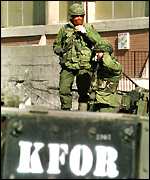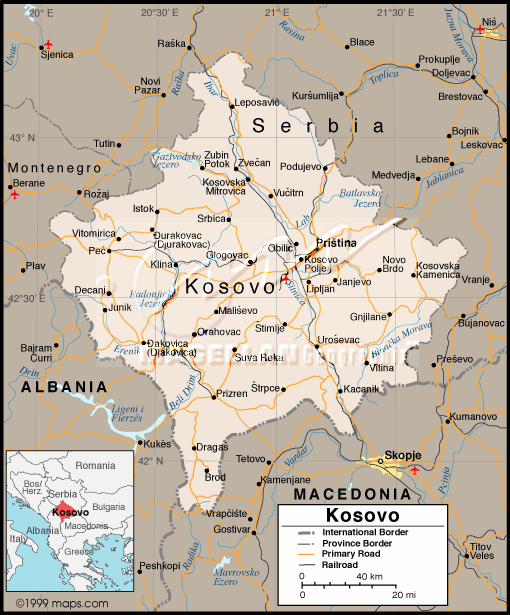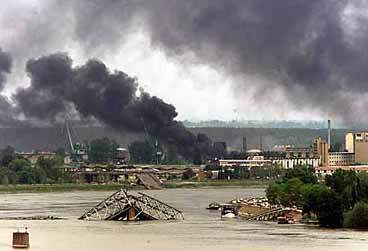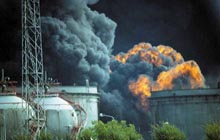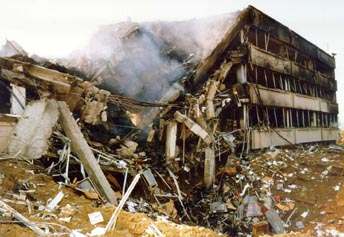
Return to front page
March 24, 1999 NATO forces began bombing targets across Yugoslavia in an air war which would last 78 days. NATO had started preparing for the bombing campaign long before, maybe as early as 1992 before Bill Clinton took office. Oct. 12 1998 NATO approved an
"activation order" (ACTORD) authorizing
preparations for a limited bombing campaign.
|
What have we accomplished? by Floyd Looney "The whole Balkan crisis began in 1989, when Milosevic basically took away Kosovo's autonomy" Madeleine Albright told interviewers after pounding the Serbs with airpower for 78 days. No mention of what the Kosovo Liberation Army and its predecessors had done against Serb targets to instigate the repealing of autonomy. Nor is it very accurate to say the crisis began in 1989, this is an ethnic hatred which goes back many generations. Remember they were even on different sides in World War-2. Kosovo had always been part of Serbia the Serbs say and a lot of it is true. The original UN mandate for K-FOR has almost run out of time, according to NATO's own agreement they are to turn control of Kosovo back to Yugoslavia sometime this June. General Wesley Clarke has recently stated that it won't be given back. This places the NATO allies in the position of violating their own agreement and being nothing more than a brazen military aggressor. The NATO allies bombed the Serbian television station in Belgrade during the war accusing it of being used for propaganda. The American and British media were hardly anything more than cheerleaders for the war against Yugoslavia. NATO began to attack civilian targets after it became clear that Yugoslav forces were not going to crumple and surrender. Attacking civilian targets to make daily life a living hell for the average person is a clear violation of the international laws which the US and Britian claim to have been preserving with their attack. "Serbia is in Kosovo, and Kosovo is in Serbia. Serbian roots are in Kosovo, and everything that is connected to the Serbs throughout the past centuries is there." General Pavkovic, Commander of the Yugoslav 3rd Army said. He said he hadn't really heard of the KLA until 1998 "Around April, it started to escalate, and the first signs of KLA emerged, first in the region of Drenica . . . and later it started to spread. . . . They were the first uniformed and masked units . . . There were incidents where a local Serb or a policeman would be killed, and it was normal that we saw those incidents as the acts of terrorism. There isn't a state in the world that would tolerate this." Albright "We had been working all along to try for a political resolution to the issue" She said, meaning that they tried to ram a bad treaty down the throats of Slobodan Milosevic. The NATO alliance had already taken Bosnia and other 'republics' away from the Republic of Yugoslavia. The alliance which was created to oppose the Soviet Union defensively had become an offensive force. "We all knew that he best understood the use of force. He didn't see the light in Bosnia until the NATO bombing, and then he agreed to the Dayton Accords." The Kosovo Liberation Army had always been considered a terrorist organization by the United States. After the allies saw what a mess was being created in Bosnia they decided that Kosovo would have to be next. The KLA was quickly to become an ally. "We were concerned by some of the activities of the KLA. We did know that they were involved in some provocative activity. But it was also evident that what the Serbs were doing to the Kosovars was enough to provoke anything." Says Albright. The NATO alliance would become the air force for the KLA in several battles during the bombing campaign. Pavkovic said about the Holbrooke mission to Kosovo: "We expected that Holbrooke would assess the situation properly, and act accordingly. With his arrival, we came to know that he was actually supporting the terrorists, and was there to help them. After all, he saw them and had talks with them, and they were illegal, in terms of state law. He didn't talk with the proper, legal state authorities who lawfully represented the state--on the contrary. From that moment on, the real Holbrooke mission was apparent" Pavkovic: "The decision was made to protect the members of the YU Army, various strategic structures, and the people of Kosovo from the terrorists. We simply couldn't stand by and watch our people being kidnapped, and the army attacked. It wasn't acceptable." 'Horse shoe operation' German Defense Minister Rudolf Scharping publicizes the existence of a document several pages long detailing the Serbian "Potkova" (Horseshoe) Operation -- allegedly a detailed plan to expel ethnic Albanians months in the making. There is never any evidence to support the claim and the document is considered by many to have been fake. The media of course, with Psychological Operations liasons never question much of anything they are told by the military. Pavkovic: "I don't know how they might have called it or whatever, but such a plan never existed. The arrival of the monitors' mission confirmed that the government in Serbia never planned any such thing. There were various actions against the terrorists to protect the people and strategic structures. There is absolutely no evidence to prove ethnic cleansing. The only thing that was going on was the fight against the terrorist activities." Tony Blair once said the war in Kosovo was a 'moral crusade'. The 100,000 dead were part of 'racial genocide'. The 100,000 or more dead soon dropped to 10,000 but UN investigators claimed to have found no more than 2,000 and many of them were probably not 'murdered'. The very reasons given for the war were false. Rambouillet "We were asking the Serbs to simply sign on to keeping Kosovo in Yugoslavia, and having an international force there to ensure that. I don't think that was asking too much. . . . It became clear that the Kosovars were willing to work with the alliance, and the Serbs had decided they would not. It was a very clear choice, which made it clear that the use of force had to take place" Albright told the interviewer. In actual fact on the final day of negotiations Albright and others slipped something else into the treaty. It would basically give NATO occupation of the entire nation of Yugoslavia. Pavkovic: "All the signs were pointing towards enormous pressure that was going to be applied, so that we should accept NATO on our territory, and that would have constituted capitulation" Albright even claims that the negotiating team was not inflexible, that it would have taken less than the treaty they came up with. "At the same time, how many Serb troops could you allow there, without having them overrun?" Just think, do you really believe that Albright was willing to take less from Milosevic? Remember what she says about the man "We were dealing with somebody who is genuinely evil, who was committed to overrunning a group of people, and who has control over his country and over his military." Aftermath K-FOR has failed to bring peace and democracy to Kosovo, and it has failed miserably. The entire Peacekeeping force turns a blind eye and deaf ear to the atrocities committed by the Kosovo Liberation Army now called the Kosovo Protection Corps. Instead of disarming the terrorist organization they gave it legitimacy. The Kosovo Albanians have conducted an orgy of murder against Serbs and the Gypsies who were too frail or old to flee Kosovo. The allies had promised to protect the minorities but instead have done nothing. Yet they do continue to disarm the remaining Serbs, leaving them defenseless against the Albanians. The Albanians have been heavily trading in heroin and prostitution, even enslaving women to service the K-FOR troops. Recently the K-FOR leadership has admitted to becoming worried about the transmission of AIDS. Ethnic and political killings continue unabated across the occupied territory. The Russians and recently the Chinese have made moves to stregnthen their ties with Serbia and calling for the Peacekeepers to be removed as the original agreements stated. The one year mandate is quickly drawing nearer and two sides are becoming clearer. NATO (K-FOR) intends to violate the very agreement they imposed on the Serbs. Pavkovic: "The situation is so bad because they are NATO down there. They didn't secure the borders, didn't protect the Serbs, didn't disarm the KLA. . . . The laws of Yugoslavia with its constitution are under suspension. Instead of law and order, they installed terror and chaos." K-FOR and the allies now seem intent on making Kosovo an independent state, the Albanians dream of their Greater Albania. This too violates the agreement that the region would never become anything else other than part of Serbia. Pavkovic: "No, it will not become independent. It was said so in the resolution in front of the whole world. A few days ago, the general secretary of the UN mentioned it again. Whatever they try to do, they can never take Kosovo and move it to America. Kosovo is in Serbia. It was under the Ottoman empire--the Turks--for 600 years. But it still remained Serbian. " "It is ours, with the UN troops inside, who will allegedly solve the Kosovo problem. We will return when the UN mandate expires, which is in a year [from the start], or if their mission fails. Who can say that the balance of the world order won't change, and the stance of the international community towards Kosovo with it?" A clash may soon ensue between the allies which are in the process of attempting to impose independence on Kosovo and the Serbs and Russians who want the alliance to live up to the agreement. Meanwhile experts are saying that Peacekeepers may be in Kosovo well into the new century. Albright is also calling for a large increase in the number of K-FOR troops. Supreme Allied Commander in Europe General Wesley Clarke is quoted as saying "Of course it was worth it. There would have been a campaign of ethnic cleansing against the Kosovo Albanians if NATO had done nothing." Would have been? When the one-year mandate is over in June 2000 there could be a clash between the allies who have no intention of living up to their agreements and the Russians and Serbs. The Russians and Serbs will insist that the agreement be followed, the Russians have not ruled out military force. Acting Prime Minister in Russia Putin is considering several possibilities should the allies violate international laws on the matter. |

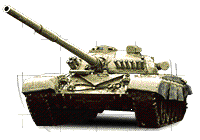 M-84 Serbian Tank Sources PBS and Frontline Resources |
